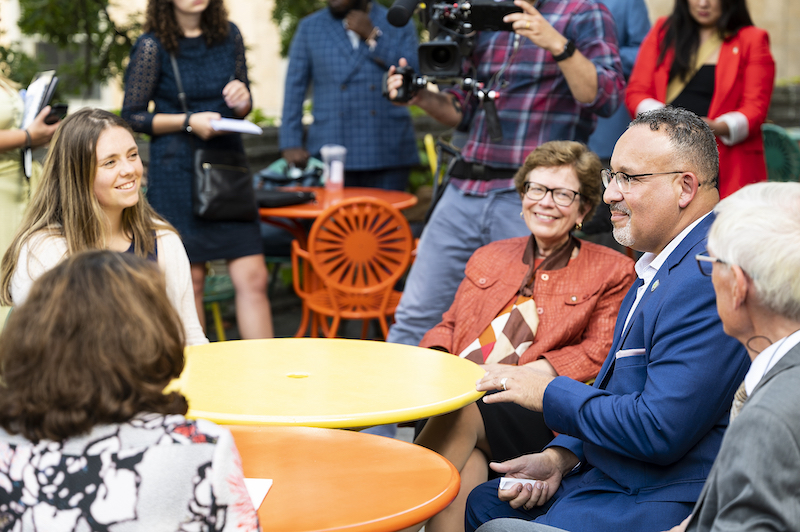A small group of people with ties to the School of Education received the unique opportunity to meet and speak with U.S. Secretary of Education Miguel Cardona during a visit to the UW–Madison campus on Sept. 20, 2021
“I don’t foresee myself going into politics, so an opportunity like this will probably never come up again,” said Catherine Arneson, who is pursuing her master’s degree through the UW–Madison Special Education Teacher (UW– SET) residency program. “I was a bit nervous, but it was just incredible.”
“Secretary Cardona was very passionate about education in general, and special education in particular,” said Bo Blocker, who graduated from the UW–SET program in August and is now teaching special education in his hometown of Beloit, Wisconsin. “He was so positive and thinking of ways to make positive change through policy and culture, and about ways to uplift the teaching profession. It was a great conversation.”

The 20-minute meeting took place on a patio area off of the second floor of the Memorial Union. Those sitting around two Terrace tables pushed together also included School of Education Dean Diana Hess, Wisconsin Gov. Tony Evers, and UW–Madison Chancellor Rebecca Blank.
Cardona stopped at UW–Madison as part of a “Return to School Road Trip” — a five-day bus tour around the Midwest in late September to high- light students and com- munities safely returning to in-person learning.
Hess provided a high-level overview of the UW–SET program — noting how students graduate with a master’s degree and Wisconsin teacher licensure in special education in 14 months. As part of the program, each graduate student takes part in a 10-month teaching residency in a partner school in Wisconsin, gaining the knowledge and skills to meet the needs of students with disabilities.
Students in the UW–SET program receive a stipend of $38,800 during the course of their residency. In return, they commit to teach three consecutive years in a partner district.
The initiative — which prepares students to work in high-need and small, rural districts — is made possible by a $2.5 million U.S. Department of Education Teacher Quality Partnership grant.
“That’s a really good program,” said Cardona.
Hess went on to explain how students can also take advantage of the UW–Madison School of Education Wisconsin Teacher Pledge program. Launched in 2020, this donor-funded initiative “pledges” to provide financial support — including up to in-state tuition, fees, and testing certification costs — for students enrolled in any of the School’s teacher education programs.
In return, after graduating, the students “pledge” to teach for three or four years at a school in Wisconsin. Students who go on to teach in a high-need district (including rural areas) or in a high-need subject area (including special education) will fulfill their obligation in three years, while all others will do so in four.
“What the UW–SET program reinforces for me is how important it is to have support from the federal government,” said Hess. “Without $2.5 million in support from the U.S. Department of Education, we wouldn’t have UW–SET. And without significant donor support we wouldn’t have the Teacher Pledge. Investments like this are vital for teacher education.”